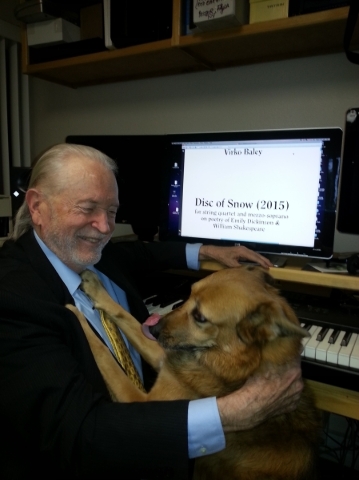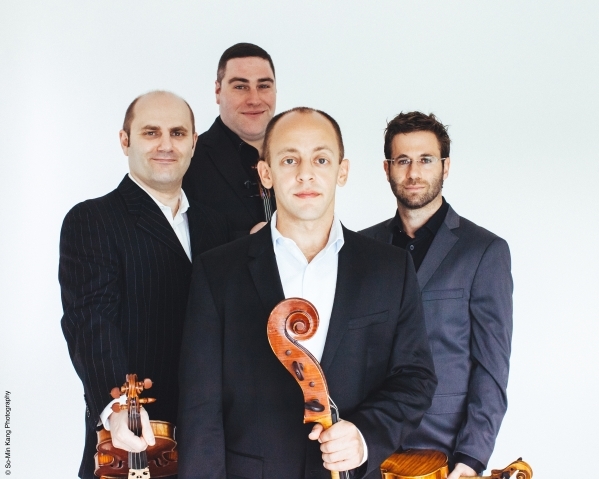Virko Baley turns Emily Dickinson’s words into music
Virko Baley began teaching at the University of Nevada, Las Vegas, in 1970.
"You do the math," he says. "It's been a long time."
So long, in fact, that UNLV's composer-in-residence, now 77, plans to retire when the current semester concludes in May.
But not before premiering one last work at the campus where he's spent "most of my adult life."
Thursday's premiere of Baley's "Disc of Snow" — inspired by, and featuring, the poetry of Emily Dickinson — is part of UNLV's ongoing Chamber Music Series at the Dr. Arturo Rando-Grillot Recital Hall.
Baley wrote "Disc of Snow" at the request of mezzo-soprano Rachel Calloway, who will perform the work with the Amernet Quartet — including her brother, the quartet's cellist, Jason Calloway.
Also on Thursday's program: Mexican composer Gabriela Ortiz's setting of Mayan texts for voice and string quartet, plus an early quartet by Anton Dvorak.
"Disc of Snow" may be a new work, but it's not the first time Baley has set Emily Dickinson's poetry to music.
It's another version of works that began as "The Emily Dickinson Songbooks" and have turned up in other Baley compositions.
Some of the six featured songs "are reuses of songs I've already written for piano," Baley notes, "redone for a (string) quartet and a different voice."
But the essential voice remains Dickinson's.
"She goes along with my kind of" philosophy, Baley explains. "Ying-yang. She was a very contradictory person. She believed in yes — and she believed in no."
In such poems as "I felt a Funeral, in my Brain" and "There is a solitude of space," Dickinson addresses such questions as "why do we live, why do we die — and why are we aware of death?" the composer says. (Such themes understandably resonate with Baley, who has battled cancer.)
Dickinson "wasn't sure there was a reason," but her sometimes elusive poetry expresses the "need to be more aware of how much we really don't know," he adds, "and how much we can't know."
Baley characterizes "Disc of Snow" as "a work in progress," representing "the first step toward completing an entire evening dedicated to traversing the intellectual and emotional life of one of the world's greatest poets."
(The words of another of the world's greatest poets, William Shakespeare, turn up in "Disc of Snow's" epilogue, an excerpt from "Hamlet.")
Beyond Dickinson's thematic qualities, "the way she put words together," with "so many ellipses, so many things left out," lend themselves to musical settings, Baley adds. "Like an actor, you can interpret it."
The composer credits one of "Disc of Snow's" interpreters, mezzo-soprano Calloway, as the project's catalyst.
He worked with the "very, very persuasive performer" about six years ago in New York, when she performed his "Klytemnestra." (You can catch that collaboration on YouTube.)
"She really liked the piece very much," he recalls, and "she said, 'Can you write something for me and a string quartet?' "
At that point, Baley notes, his recovery from cancer — and work on his opera "Holodomor," about the 1932-33 famine in his native Ukraine — were his top priorities.
But "about a year ago, I contacted her" and said, " 'Yeah, I think the time has come.' "
For members of the Amernet Quartet, Baley's "Disc of Snow" represents a welcome opportunity to debut a new composition, according to cellist Jason Calloway.
Just as actors like "to create a role," musicians welcome the chance to interpret "a new piece — to bring it to life for the very first time," Calloway says in a telephone interview from the quartet's Florida base. (He, violinists Tomas Cotik and Misha Vitenson and violist Michael Klotz are the ensemble-in-residence at Miami's Florida International University; their "in-house singer," Calloway's sister Rachel, is based in New York.)
"From a purely selfish perspective, we enjoy very much working with composers," the cellist points out, citing "a nice Skype session" with Baley, who "was able to coach us through" some questions.
Following in the footsteps of musical mentors in the Juilliard and LaSalle string quartets, the Amernet Quartet's members try to "treat old music as if it were just written and to treat new music as if it were already part of the canon."
For Baley — who marks his first venture into a musical "landscape where the string quartet is the dominant instrument of choice" — the new "Disc of Snow" represents "a humble beginning" that "asks the human voice … to help strengthen the meaning … "
Following the composer's official retirement, Baley plans to return to UNLV in September for the return of Nevada Encounters of New Music, also known as N.E.O.N.
But "after that, I don't know," Baley says. "I may be involved in a concert or two a year."
Or maybe not.
When he first decided to retire, he wondered, " 'Am I really doing the right thing?' But there are so many things I want to do," once relegated to the "back burner, that I will now be able to do."
Read more stories from Carol Cling at reviewjournal.com. Contact her at ccling@reviewjournal.com and follow @CarolSCling on Twitter.



























